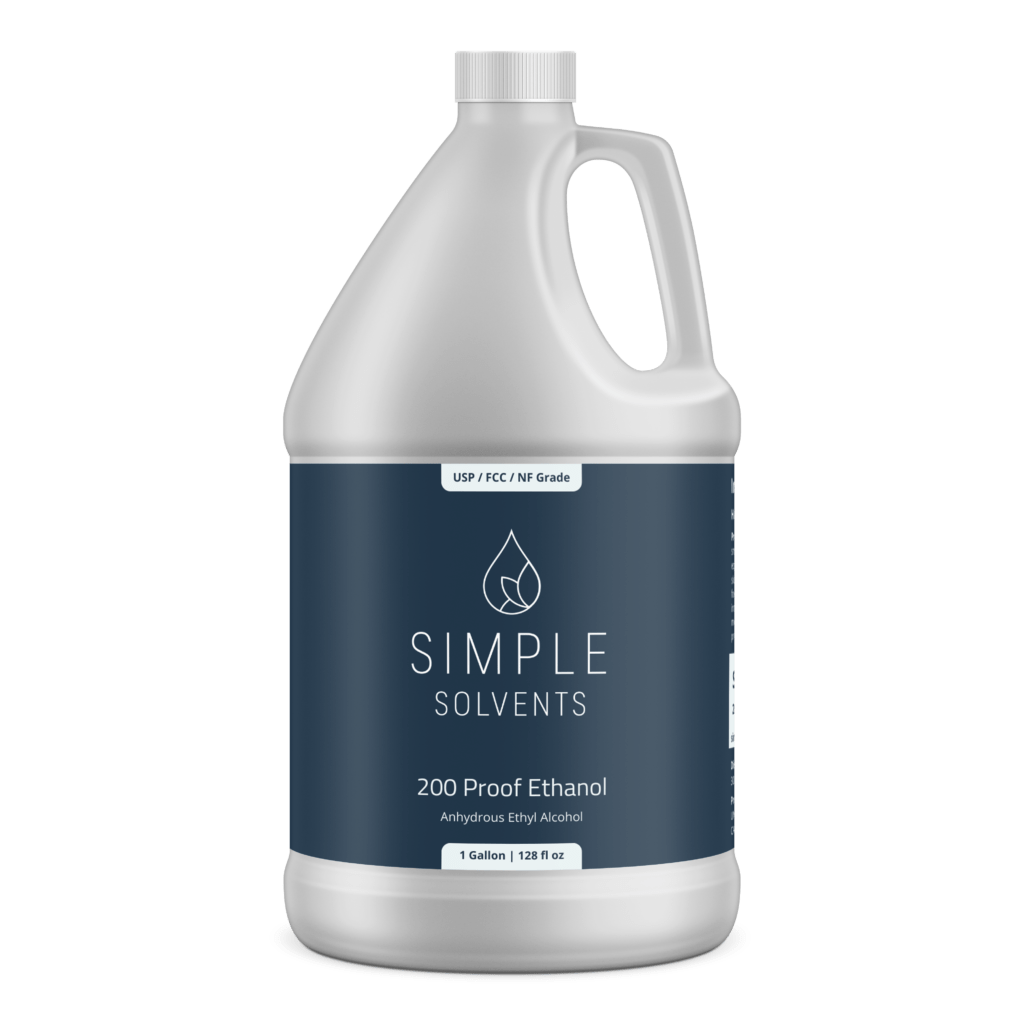190 Proof vs. 200 Proof Ethanol Differences

190 Proof vs. 200 Proof Ethanol differences
190 Proof vs. 200 Proof Ethanol differences; the alcohol manufacturing business generated a household revenue of 28.7 billion in 2021. That effect was majorly due to the solvent’s use in manufacturing sanitizers to combat COVID-19.
Botanical oil industries also used ethanol in their extraction processes. And thereby, the companies provided products that could help manage anxiety and depression that arose during the pandemic.
However, there’s a lot of confusion concerning alcohol grades as the industry grows. Notably, what are the differences and uses of 190 proof and 200 proof ethanol?
But don’t worry, you learn all about those solvents in this article. So let’s dive into it.

What is Ethanol?
Most people refer to the solvent as either alcohol, grain alcohol, ethyl alcohol. The flammable solution has a unique smell; it’s clear, colorless, and volatile.
Companies manufacture the solution by fermenting cereals, such as grains, malt, or grapes using yeast cells and bacteria like lactobacilli. You’ll also find vendors who prefer to manufacture ethanol by ethene hydration using steam and a silicon dioxide catalyst.
Types of Ethanol Grades
Sellers classify alcohol strengths using ‘Proof,’ calculated according to the amount of water mixed with ethanol. In that case, 190 proof means that you have 95% alcohol, of which the remaining 5% is water used in the dilution process. And if you have 200 proof alcohol, you’ll be using 100% alcohol with no water.
95% Ethanol
Users also know the product as 190 proof alcohol. Companies manufacture the solvent through a distillation process. And the end product is an azeotropic mixture containing 95.6% ethanol and 4.4% water.
100% Absolute Ethanol
This product has the highest alcohol concentration of up to 100%. Manufacturers make it by introducing additives such as benzene to the azeotrope process, which enhances further distillation.
The solvent is thus mainly used as a reagent in processes sensitive to water. Note that you’ll need to cap your storage container tightly to prevent water addition from the atmosphere.
Denatured Alcohol
Sometimes, you’ll find that companies denature ethanol (190 or 200 proof) using additives such as methanol, benzene, and isopropyl alcohol. And that process makes the solution unsuitable for human consumption.
Therefore, chemistry and biochemistry laboratories find the product useful. Note that all those solvents are unsafe for consumption.
Uses of 190 Proof Alcohol & 200 Proof Alcohol
Ethanol for Oil Extraction Processes
Many oil extraction manufacturers use ethanol to get essential oils such as CBD oil, olive oil, seed oils, etc. The companies find the solvent valuable because alcohol effectively dissolves organic molecules; it’s safe and cheap.
The extractors use alcohol in the winterization process. That technique incubates the crude oil material with the solvent at low temperatures. Consequently, they dissolve and precipitate the unwanted substances for easy filtering.
Ethanol leaves a non-toxic end product. And you can recycle the solvent since it evaporates at the end of the extraction process. Therefore, you’ll maximize your profits by cutting the production costs and increasing the quantity of extracted products.
The law allows you to purchase ethanol for industrial purposes in bulk. And when you buy the product from reputable sources, you can therefore enjoy discounts from buying alcohol in large amounts.
Manufacturing Alcoholic Beverages
Did you know that alcohol use for recreational purposes dates back to 5000 BC? Now you do. Beer distilleries make your favorite drinks by mixing the liquid with water to make them safe for consumption. The solvent now becomes the intoxicating agent that helps you feel euphoric after a hard day.
Scientists also note that taking the beverage helps reduce anxiety and increases your sociability by making you more talkative. However, the product also reduces your motor function and memory and induces loss of coordination. Alcohol abuse also leads to hangovers and addiction. Therefore, ensure you drink responsibly.
Manufacturing Gasoline Fuel
Motor companies use the solvent as engine fuel and as fuel additives. Alcohol is convenient when it burns off, and it produces carbon dioxide and water. And that makes the product reduce air pollution and global warming, making it a safer alternative to petroleum.
In 1945, the Germans fired a missile using a mixture of pure ethanol and water as fuel. And since then, the solvent has changed the energy and aerospace industry. For example, the U.S launched its first space satellite using a rocket engine running on ethanol as a fuel source.
Ethanol as a Cleaning Agent
You can use alcohol for many household purposes. For example, the product helps you remove stains on windows, plastics, or car windshields without damaging the surfaces.
Ethanol in the Food Industry
Some wine companies use ethanol as an additive to end the wine fermentation process, making their drinks very sweet. Bakers and chefs also use the solvent to preserve foods.
Ethanol in Skin Care Products
Cosmetics industries use alcohol to preserve lotion ingredients, ensuring they don’t separate. The solvent also helps hair spray adhere to the hair strands, thus providing a long-lasting effect. And some people tone their skin by utilizing the product as an astringent.
Ethanol as a Disinfectant
Disinfectant companies use ethanol to manufacture sanitation wipes and hand sanitizers. Customers can thus use the solvent to prevent the spread of disease-causing micro-organisms such as bacteria and viruses. In addition, the liquid benefits you by denaturing the bacterial cell wall lipids, thus leading to the organism’s death.
Alcohol prevents fatal wound infections in hospital settings. The solvent provides that benefit through its disinfecting properties, which help sterilize the skin before surgical procedures.
Pharmaceutical companies use the liquid to enhance drug absorption into the body. That improvement is feasible when alcohol dissolves water-insoluble ingredients used to make cough and pain drugs.
Conclusion
190 proof and 200 proof alcohol only differ in the amount of water they contain. And for that reason, you’ll find 200 proof ethanol more efficient in processes that don’t require water. However, you can still use both solvents in various industrial and household activities.
Manufacturing processes that use ethanol include oil extraction, making alcoholic drinks, cosmetics, gasoline, and disinfectants. Household uses include cleaning and food preservation. Keep the solvent in a well-ventilated area and away from direct flames. Visit www.SimpleSolvents.com to view what we have to offer.
